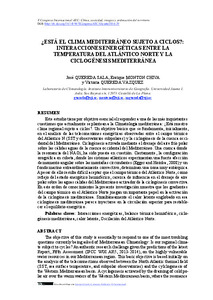Por favor, use este identificador para citar o enlazar este ítem:
http://hdl.handle.net/20.500.11765/8011
¿Está el clima mediterráneo sujeto a ciclos?: interacciones energéticas entre la temperatura del Atlántico norte y la ciclogénesis mediterránea
| Título : | ¿Está el clima mediterráneo sujeto a ciclos?: interacciones energéticas entre la temperatura del Atlántico norte y la ciclogénesis mediterránea |
| Autor : | Quereda Sala, José; Montón Chiva, Enrique; Quereda Vázquez, Victoria |
| Palabras clave : | Interacciones energéticas; Balance térmico hemisférico; Calor latente; Ciclogénesis mediterránea; Oscilación del Atlántico Norte; Hemispheric thermal balance; Energy interactions; Mediterranean cyclogenesis; Latent heat; North Atlantic Oscillation |
| Fecha de publicación : | 2016 |
| Editor: | Asociación Española de Climatología |
| Citación : | Olcina Cantos, Jorge; Rico Amorós, Antonio M.; Moltó Mantero, Enrique (eds.). Clima, sociedad, riesgos y ordenación del territorio. Alicante: Instituto Interuniversitario de Geografía, Universidad de Alicante; [Sevilla]: Asociación Española de Climatología, 2016, p. 309-321 |
| Serie/Num. : | Publicaciones de la Asociación Española de Climatología. Serie A;10 |
| Resumen : | [ES]Este estudio tiene por objetivo esencial el responder a una de las más inquietantes
cuestiones que actualmente se plantean a la Climatología mediterránea: ¿Está nuestro
clima regional sujeto a ciclos?. Un objetivo básico que se fundamenta, inicialmente,
en el análisis de las teleconexiones energéticas observadas entre el campo térmico
del Atlántico N (SST y observatorios subpolares) y la ciclogénesis de la cuenca occidental
del Mediterráneo. Ciclogénesis activada mediante el drenaje del aire frío polar
sobre las cálidas aguas de la cuenca occidental del Mediterráneo. Una cuenca donde
la resonancia del NAOi, ha sido puesta en cuestión. [EN]The objective of this study is essentially to respond to one of the most troubling questions currently being asked of Mediterranean Climatology: Is our regional climate subject to cycles? An authentic research challenge given the predictions of the latest Report, Fifth Assessment (IPCC WGI AR5, 2013-2014), on the highly vulnerable water resources in our Mediterranean region. This basic objective is based initially on the analysis of the teleconnections observed between the North Atlantic thermal field (SST, sea surface temperature, and subpolar observatories) and the cylclogenesis of the Western Mediterranean basin. A cyclogenesis activated by the draining of cold polar air over the warm waters of the Western Mediterranean basin, where the resonance of the NAOi (the pressure index in the North Atlantic), has been brought into question. Indeed, the basin orographic configuration, where the Mediterranean systems have for now a strong angular momentum transfer over the surrounding mountains (Egger and Hoinka, 2008) and an extraordinarily convective sea bed, define what is a very autarkic zone. |
| Descripción : | Ponencia presentada en: X Congreso de la Asociación Española de Climatología celebrado en Alicante entre el 5 y el 8 de octubre de 2016. |
| URI : | http://hdl.handle.net/20.500.11765/8011 |
| ISBN : | 978-84-16724-19-2 |
| Colecciones: | (2016, Alicante). X Congreso AEC |
Ficheros en este ítem:
| Fichero | Descripción | Tamaño | Formato | ||
|---|---|---|---|---|---|
| 0045_X-2016-QUEREDA.pdf | 2,3 MB | Adobe PDF |  Visualizar/Abrir |
Los ítems de Arcimis están protegidos por una Licencia Creative Commons, salvo que se indique lo contrario.





